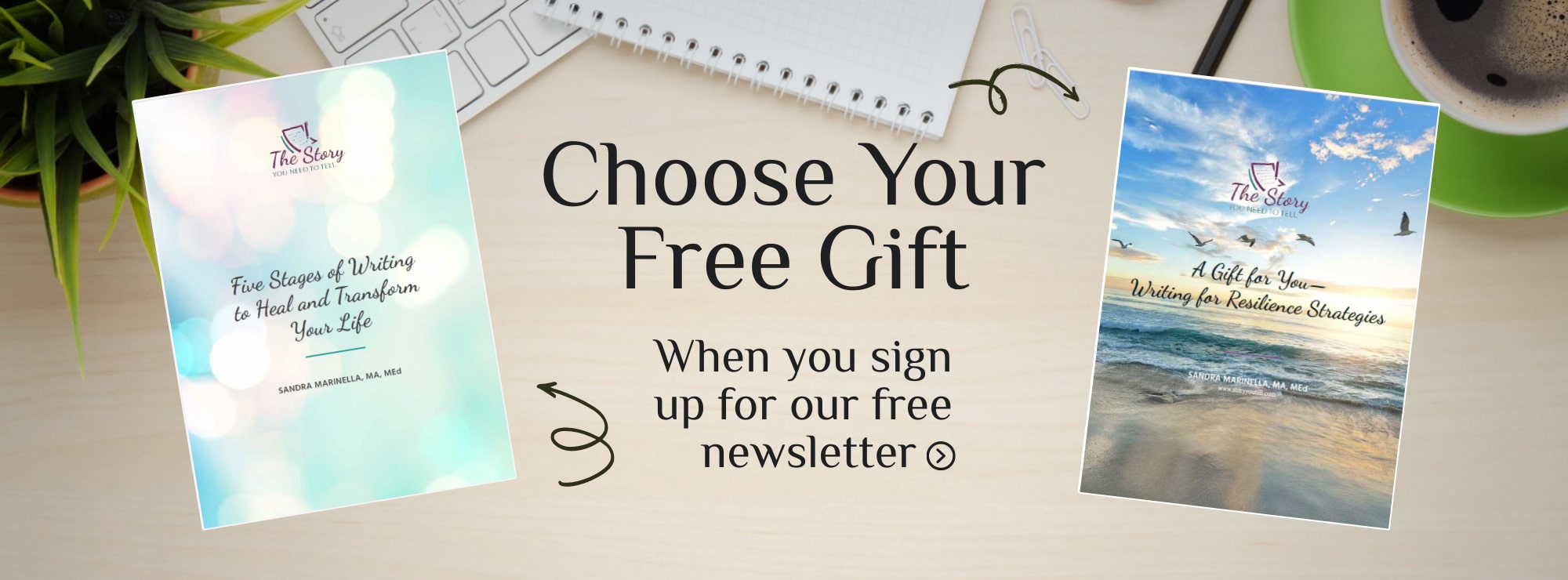Write Your Story
Eleven years ago, I discovered I had breast cancer. The experience shook me to the core. Although I knew my life would change, it would be a long time before I realized it would be an uplifting and needed change.
Before cancer, I had always planned to pen my story, but I had been too busy raising my sons, too busy with Steve and my friends, too consumed by teaching. All I wrote were pages in my journal. Over the summers I wrote articles, stories, and during graduate school I completed the draft of a novel, but I am thankful it was inadvertently hauled off to Goodwill on the hard drive of my old NorthStar computer.
Then in 2012 I had the diagnosis. According to a recent Mayo Clinic report, half of us will face mutant cells diagnosed as cancer. Fifty percent of us! Several months later, as I lay in bed recovering from a double mastectomy, scribbling in my journal, I intuited a new path. I would finally write my story and weave into it how story and writing had given my life renewed meaning. Of course, my life had been filled with many transitions–marriage, children, teaching, graduate school, but in truth nothing has remade me more than writing my story. It grew me exponentially. Now I watch my writers experience the same wonderful growth as they write.
For me this growth began with a mentor. On my shelves I had all of Christina Baldwin’s books. She was a visionary who started the personal writing movement when I was a young high school teacher. Her work was pivotal in helping me not only to teach writing, but in showing my students how writing could lead to positive change in their lives. I thumbed through all of her books, but I buried myself in Storycatcher—Making Sense of Our Lives through the Power and Practice of Story.
The words of this book took hold of me. It helped me frame my understanding of why I had always taught stories and how I had come to believe that we are the authors of our own stories. While we cannot always control what happens to us, we can learn from our experiences, and we can reframe our hard stories in positive ways that encourage personal growth. Baldwin’s book led me into deeper and deeper research—Pennebaker, Michael White, Timothy Wilson—the list is long. When I wrote to Christina about my work, she agreed to help by reading my chapters. A friendship was born.
While I started writing my story in 2012, The Story You Need to Tell wasn’t finished until 2017, five years after I began. At first, I was buoyed by all I was learning. Once I had a messy first draft, the real work began. I had to juggle my learning, test out my ideas, and teach this new method of writing to my students. I wrote life stories and rewrote them. I reframed, edited, rewrote, and did this time and time again. The work was both challenging and rewarding. Often it was lonely.
At some point I wrestled with the issue of publication. I was troubled that at my age I might never publish. But then it hit me. The writing was the real gift. Publication would be like whip cream—nice but not essential. The writing helped me see my life as something that I was creating and giving meaning to. It allowed me a deeper understanding of who I had been, who I was, and who I was becoming.
Christina told me books have their own lives. Writers just give birth to them. This proved to be true. When I connected with a publisher, New World Library, the book charged forward with her own personality. I stood by in awe as she embraced writers and women and cancer patients. While it wasn’t easy to juggle all the hoopla surrounding publication, it was worth it. The connections. The interviews. The learning. The whole of it.
In the end, what did I learn? I learned that we all have stories that need to be told. I learned that we have the power to change our perspective from victim to victor, from survivor to thriver, from loser to winner. Many of my insights are summed up in the book’s foreword.
You cannot go back and change your life stories. Embracing your stories is not about lying or self-delusion. Becoming the author of your story is about claiming the power to define what something means to you and to take charge of the ways your life events impact you and influence how you move forward.
All of us get knocked to the ground. Rather your challenge is watching your best friend shot in the face while at war in Afghanistan or struggling with the accidental death of your son to fentanyl, you must manage your life—and it will not be easy. The promise I uncovered was that we all have the power to take the next step forward and writing can help you find your way to the next risk, the next move, and to keep saying yes to life. You can.
I am grateful to Christina, and I am grateful to my readers. Writing my story changed my life more than I could imagine, and I am calling out to you to find and write your story. I believe it will be worth every hard, lonely, and beautiful moment. Do it!
(A special thank you to Christina Baldwin for her support and the inspiring name she created, Storycatchers!)




